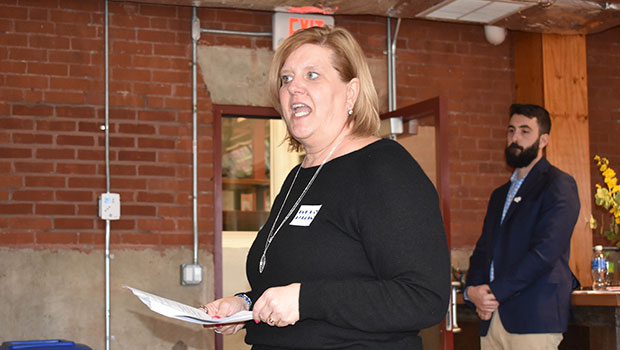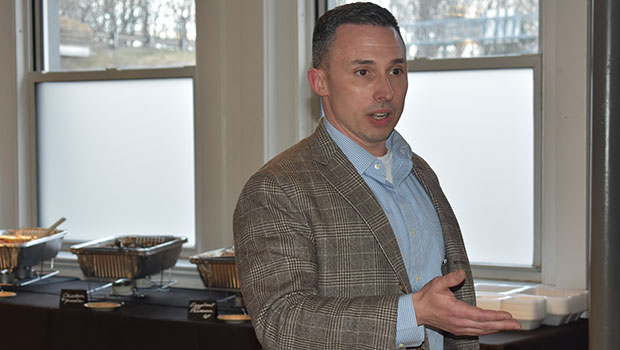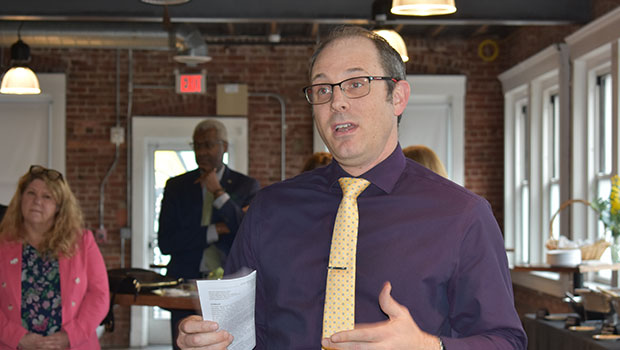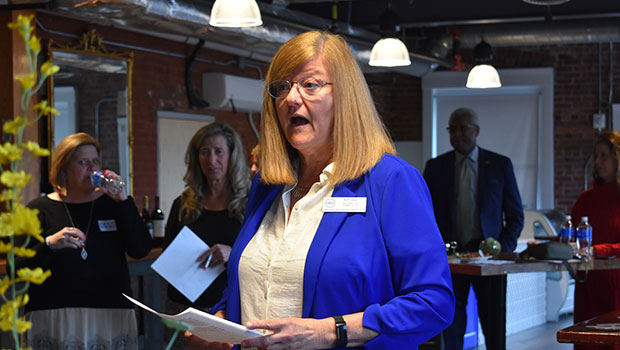CEA members gathered yesterday evening at Hartford’s Parkville Market for the first of several county forums being held across the state now through March 28.
They heard from colleagues running for various offices ranging from NEA Director to CEA president. They also shared with guest legislator Representative Mike Demicco their education priorities for 2024, explaining why each one matters.
Stories paint a picture
“Telling our legislators why each of these priorities is personally important to us and sharing examples and stories of impact helps animate the issues,” said CEA President Kate Dias.
“When we talk about the need for a minimum starting salary for teachers, we need to illustrate the challenges faced by educators making $42,000 a year with massive student debt. When we talk about just cause, it’s important to note that teachers are not looking for rights and protections above and beyond what other school employees have, including custodial, secretarial, and administrative staff.”
Dias identified other key measures CEA is advocating for at the legislature, including changes to DCF’s mandated reporting process, streamlining teacher certification, providing COVID recognition for teachers who worked through the pandemic, democratizing the election process for members of the Teachers’ Retirement Board, and more.
“We were really happy that the General Assembly took action last year to allow for additional retiree voices on the Teachers’ Retirement Board,” said Avon Education Association President Jon Moss. “The election cycle for those seats, however, is offset from the cycle for the other seats, which creates a logistical challenge. Importantly, too, there are eight teacher representatives on the Teachers’ Retirement Board: four active and four retired. But while six of those individuals are elected by all members impacted by the TRB—active and retired—only retirees can vote for the two seats added last year. The decisions that the TRB makes affect all of us, so we need to make sure everyone has the opportunity to vote for all teacher representatives.”
Redrawing the starting line
Raising the minimum starting salary for teachers was a major topic at last night’s forum, where Demicco—whose daughter teaches high school and has shared her own experiences with him—listened to concerns from others with a front-row seat to Connecticut’s teacher shortage.
“Raising starting salaries is not just a teacher issue, it’s a public education issue,” said 28-year veteran East Hartford Education Association President Paul Apostalon. “We need to treat and pay educators in a way that shows them that there’s value in this profession. I look around at my own department and see that we’re all five years away from retirement, and I wonder, who’s going to fill these spots? How are we going to recruit quality candidates to pursue this career? Many of our districts are paying teachers $42,000 or $45,000, and that doesn’t make sense to me. When I ask my students, ‘How many of you would consider going into teaching?’ they laugh.”
Newington teacher Jennifer Rodriguez noted that her district is 24th lowest on the teacher pay scale out of 29 districts in the Greater Hartford area.
“We are below the average starting pay, and that results in tremendous turnover,” she said. “We had 31 teachers leave our district last year.”

Berlin teacher Kelly Dumas makes a case for raising educators’ starting salaries.
One forum attendee recalled that her son went to college to be a teacher, graduating at the top of his class, and decided to pursue a career in sales for better income potential.
“My son just got a job making $137,000, and I haven’t broken $100,000,” she said. “I have two master’s degrees and have been teaching 25 years.”
“We can’t expect society to view teachers in a different light if there isn’t an opportunity for them to earn competitive salaries, if we consistently put teachers the bottom of the barrel,” Berlin Education Association President Evelisa Mayette agreed. “We have young people unapologetically saying they don’t want to go into teaching because of the low pay and lack of support.”
“Our salaries are not competitive,” Dias emphasized. “We have students taking on college loans and making career decisions, and if we want to be a competitive field, we have to have competitive wages.”
Money matters
Uncertainty and inconsistency around Education Cost Sharing grants and excess costs are an added problem, said Granby Education Association President KC Petruzzi, pointing out that uncertainty often results in budget cuts that target teaching positions, keep educator wages down, and harm students.
“We have towns right now actively cutting teachers and cutting resources because of the governor’s proposed budget cuts; we are 100% feeling that in the field,” Dias said, adding that excess costs associated with special education have left some municipalities with tens of millions of dollars in unreimbursed special education costs, creating a significant funding gap.
“The state needs to step up and fix this and not leave the towns with the responsibility,” Demicco agreed.
“The state has the responsibility to set the tone and tenor here,” said CEA Vice President Joslyn DeLancey, explaining that funding shortfalls don’t often result in districts focusing on the right priorities.
“They’ll still fund what they want to fund,” she said. “Too often, the cuts they choose hurt teachers, paraeudcators, and ultimately our students.”

Rep. Mike Demicco addresses teachers’ concerns at the Hartford County Forum.
Demicco asked questions and took careful notes throughout the Hartford County Forum, pledging to continue advocating for educators and bringing their concerns back to his colleagues. The face-to-face dialogue, he said, helped him gain not only a clearer understanding of the challenges teachers face but also how to navigate pushback against teachers’ priorities.
“I know my colleagues and I appreciate hearing directly from you at events like these and CEA’s Breakfast with Legislators last month,” he said. “That was a lively morning, and we learned a lot about many of the wide-ranging issues that concern you. Keep it up.”
In other discussions with legislators this week, Southington teachers met with Representative Chris Poulos, and Glastonbury teachers met with Senator MD Rahman and Representatives Jill Barry and Jason Doucette, sharing their personal stories and education priorities. Back-home meetings with CEA members and their legislators are taking place in cities and towns throughout Connecticut. To arrange a meeting with your legislators, contact CEA’s Gus Melita.























